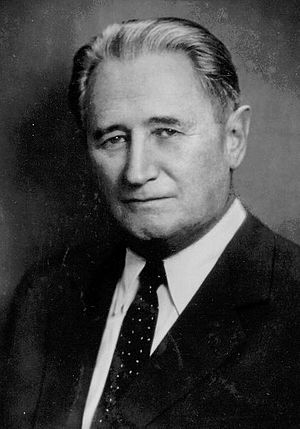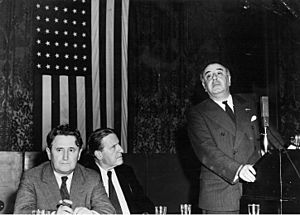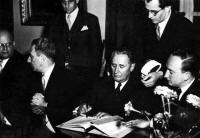Nahum Goldmann facts for kids
Quick facts for kids
Nahum Goldmann
|
|
|---|---|
| נחום גולדמן | |

Nahum Goldmann
|
|
| Born | July 10, 1895 |
| Died | August 29, 1982 (aged 87) |
| Known for | Founder and president of the World Jewish Congress |
Nahum Goldmann (Hebrew: נחום גולדמן) (July 10, 1895 – August 29, 1982) was a very important leader in the Zionist movement. Zionism is the idea of supporting a Jewish homeland. He helped start the World Jewish Congress and was its president from 1951 to 1978. He also led the World Zionist Organization from 1956 to 1968.
Contents
About Nahum Goldmann
Nahum Goldmann was born in 1895 in Vishnevo, which was part of the Russian Empire. This town was a small Jewish community called a shtetl. His family were teachers and writers, and his father was a strong supporter of Zionism.
When he was six, his family moved to Frankfurt, Germany. His father often hosted important Zionist leaders and thinkers there. Nahum went to school in Frankfurt and later studied law, history, and philosophy at universities.
In 1913, he visited Palestine for four months. He wrote a book about his experiences there. Later, he worked for a German office that tried to use different national groups, like Zionists, to help Germany's interests during World War I. During this time, he tried to get the German Emperor, Kaiser Wilhelm, to support the idea of a Jewish homeland.
In 1922, he started a publishing company. He also helped create the Encyclopaedia Judaica, a big collection of knowledge about Jewish history and culture.
In 1934, Nahum Goldmann married Alice Gottschalk. They had two sons, Guido and Michael. Guido later started an important organization called the German Marshall Fund in the United States.
In 1935, the Nazis took away his German citizenship. He became a citizen of Honduras with help from a French minister. He then moved to the United States, living in New York City. There, he worked for the Jewish Agency, an organization that helped Jewish people.
In 1936, Goldmann and Rabbi Stephen S. Wise created the World Jewish Congress (WJC). He was one of the first to understand how dangerous Adolf Hitler and the Nazi Party were. In 1942, he warned about what the Nazis might do. He said that half of his generation was being killed, and the other half felt helpless. He lived in the United States until 1964 and became a U.S. citizen.
Nahum Goldmann passed away in Germany in 1982. He was buried in Mount Herzl National Cemetery in Jerusalem, a special place for Zionist leaders. Even Yasser Arafat, a Palestinian leader, sent his condolences. Arafat said that Goldmann fought for justice and rights for all people.
Working for Jewish Rights
Goldmann saw that Jewish leaders in the U.S. were not working together well. He believed that unity was very important. He and Stephen Wise wanted Jewish people to be more informed and active. However, during World War II, they thought quiet talks behind the scenes were better than public protests.
Goldmann believed in being careful when putting political pressure on governments. He did not lead a big public campaign against the American immigration rules, even when many European Jews needed a safe place from the Nazis. An international meeting called the Evian Conference was held in 1938 to help Jewish refugees. Goldmann attended as an observer. Out of 32 countries, only the Dominican Republic agreed to take more refugees.
Because of this, efforts focused on creating a Jewish homeland in Palestine. In 1942, Goldmann called for a special Zionist meeting. This meeting created the Biltmore program, which asked for unlimited Jewish immigration to Palestine. Goldmann warned that the Nazis' threats should be taken seriously, as they could lead to terrible consequences for European Jews.
In 1945, Goldmann helped create a committee to rescue and help the Jewish people who survived the Holocaust in Europe. He had always supported the idea of two states in Palestine: one Arab and one Jewish. He believed that having an independent state was more important than controlling every piece of land. After the war, he worked with David Ben-Gurion to create Israel. However, he advised Ben-Gurion to wait before declaring independence to try and make a diplomatic agreement with the Arabs. He worried about a war breaking out after the British left.
From 1951, he was the head of the Jewish Agency. That year, he brought together 23 Jewish organizations to talk about getting payments from West Germany for the losses caused by Nazi Germany and the Holocaust. This led to the creation of the Conference on Jewish Material Claims against Germany, also known as the Claims Conference. In 1952, after six months of talks, an agreement was signed with West Germany. David Ben-Gurion said this was a historic moment because, for the first time, those who had harmed the Jewish people had to pay for some of the damage.
Goldmann was the president of the World Jewish Congress, which connects many Jewish organizations outside Israel. He supported Israel in other countries, but he also openly criticized some of Israel's policies. From 1956 to 1968, he was the President of the World Zionist Organization. He disagreed with Israel's actions in capturing Adolf Eichmann and thought the matter should have gone to an international court. He became a citizen of Israel in 1962 and of Switzerland in 1969. He lived in Paris for the last part of his life and held seven different citizenships during his lifetime.
Goldmann's Ideas and Opinions
Even though Goldmann strongly supported Zionism, he also believed in the importance of Jewish communities living outside Israel, known as the Diaspora. He felt that a Jewish state alone could not meet all the needs of the Jewish people. He was concerned about Jewish people losing their culture and worked to strengthen Jewish education and traditions outside of Israel.
Goldmann often criticized Israel for relying too much on its military. He also thought Israel should have made more agreements after the 1967 Six-Day War. He believed that Israel's best chance for long-term survival was to accept the rights of the Palestinians as a people.
He always spoke about the need for peaceful living between Arabs and Israelis. He said, "There can be no future for the Jewish state unless agreement is reached with the Arabs."
In 1967, he met with Yugoslav leader Josip Broz Tito to share his ideas for peace. In 1970, he was invited to talks by Egyptian president Gamel Abdel Nasser, but the Israeli government stopped him. His attempts to contact PLO leader Yasser Arafat in 1974 were seen as very controversial. In 1982, he asked the Israeli Prime Minister not to cause more anti-Jewish feelings with the invasion of Lebanon.
During the siege of Beirut, a PLO leader asked Goldmann for advice. Goldmann suggested five steps for the PLO:
- Leave Beirut.
- Stop terrorism.
- Move to Tunis, where they could have more political freedom.
- Form a temporary government that many countries would recognize.
- Recognize Israel.
Goldmann believed that if these steps were taken, it would help create a Palestinian state next to Israel. His dream was for Israel to be a spiritual and moral center for all Jews. He imagined Israel as a neutral state, like Switzerland, with its safety and borders guaranteed by other countries.
Books by Nahum Goldmann
- Erez-Israel—Reisebriefe aus Palästina 1914 (Travel letters from Palestine 1914)
- Der Geist des Militarismus (The Spirit of Militarism) 1915
- Von der weltkulturellen Bedeutung und Aufgabe des Judentums (Of the world-cultural meaning and task of the Jews) 1916
- Staatsmann ohne Staat (Statesman Without a State, his autobiography), 1970
- Mein Leben als deutscher Jude (My Life as a German Jew), 1982
- "Zionist Ideology and the Reality of Israel," Foreign Affairs, Fall 1978.
- He also wrote 3 works in Yiddish language.
Honors and Memory
- In 1956, he received the Solomon Bublick Award from the Hebrew University of Jerusalem.
- In 1968, he was honored with the Order of Rio Branco.
- The Beth Hatefutsoth, the Museum of the Jewish Diaspora, at Tel Aviv University remembers his work.
- There is a program called The Nahum Goldmann Fellowship Program.
See also
 In Spanish: Nahum Goldmann para niños
In Spanish: Nahum Goldmann para niños
- Claims Conference
- Conference of Presidents of Major American Jewish Organizations
- Jewish Agency for Israel
- Wiedergutmachung
- World Jewish Congress
- World Zionist Organization
 | William M. Jackson |
 | Juan E. Gilbert |
 | Neil deGrasse Tyson |



